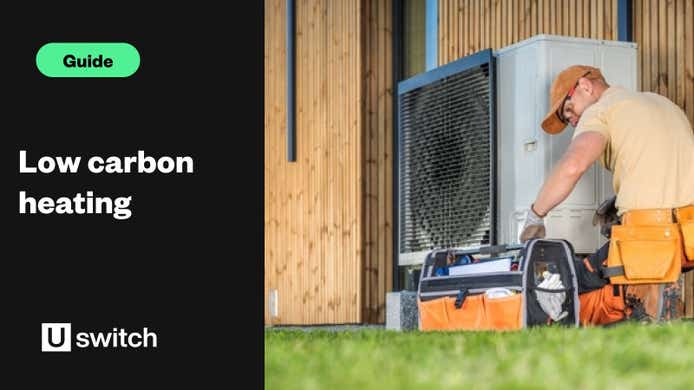Universities across the UK are once again assessed for their sustainability credentials for the annual Green University Report.
Uswitch sought to see if the UK’s education establishments are doing enough to be considered green universities. This annual study is designed to see which universities are leading the way in terms of green initiatives and renewable energy.
Our best green energy deals
Search on Uswitch to find the cheapest green energy tariffs for you.
This information was obtained with a Freedom of Information request to 133 universities. We asked:
1. Who is your main energy supplier? (Please provide the supplier name individually for both gas and electricity if applicable).
2. Are you on a green/renewable energy tariff with them? (Please answer Yes/No individually for both gas and electric if applicable).
3. Do you have any renewable installations across your buildings? If yes, please state which of the following you have and any others not listed:
- Solar panels
- Solar thermal panels
- Wind turbines
- Air source heat pump
- Ground source heat pump
- Biomass systems
- Hydroelectric systems
- Other
4. Do you have any fully electric vehicles on your fleet of vehicles for staff (not including hybrids)? If yes, please state how many.
5. Do you currently employ anyone who oversees the implementation of sustainability strategies at the university (for example, a “Sustainability Officer”)?
6. Do you provide workshops/lessons on sustainable practices for your students? If yes, please provide any examples you’d like to shout about.
7. Are there any eco-friendly initiatives across your buildings such as bike schemes, recycling initiatives, etc? If so, please state them.
We have subsequently split the universities into four tiers based on their answers to the above questions.
Platinum tier: Top committed green universities
Those who scored positively in seven out of seven criteria.
| University name | Green electricity tariff | Green gas tariff | Renewable installations | Electric vehicles | Sustainability employee | Workshops | Eco-friendly initiatives |
|---|---|---|---|---|---|---|---|
| Edge Hill University | Y | Y | Y | Y | Y | Y | Y |
| Wrexham Glyndŵr University | Y | Y | Y | Y | Y | Y | Y |
| Goldsmiths, University of London | Y | Y | Y | Y | Y | Y | Y |
| University of Birmingham | Y | Y | Y | Y | Y | Y | Y |
| University of Chichester | Y | Y | Y | Y | Y | Y | Y |
| University St Andrews | Y | Y | Y | Y | Y | Y | Y |
Encouragingly, six universities of the 111 that responded came back with seven positive notes on the questions we asked.
Among these, Wrexham Glyndŵr University has the most on-site renewable installations featuring solar panels, solar thermal, an air source heat pump and a hydroelectric system. The most popular renewable installation across this tier is solar panels, with all of the universities featuring them on campus.
Find out more about renewable energy sources.
Electric vehicles are part of all of these universities' vehicle fleets. However, a couple have gone above and beyond, with the University of Birmingham boasting 44 electric vehicles, of which 39 are vans and four are cars. The University of St. Andrews has a total of 22 EVs consisting of six electric cars, 14 vans and two tractors. All of the universities in this tier have at least two electric vehicles as part of their fleet.
Each of these universities employs someone or a team to oversee its sustainability practices as well as offering workshops or classes to its students and staff. The University of Chichester states that it has a strategic objective to ensure that all staff and students can access carbon literacy training by 2025, and Edge Hill University is running a sustainability week in November 2023.
Eco-friendly initiatives are run by all of the universities, but the University of Chichester runs events such as “Green Weeks” which has been organised by its student union in conjunction with the university for the past three years. It is also working towards Responsible Futures Accreditation and won a gold award for having a hedgehog-friendly campus in February 2023. Goldsmiths, on the other hand, is ending the use of pesticides and herbicides as well as planting and maintaining trees on campus.
It's more important than ever to make sure that our energy usage is as green as possible. Read our green energy guides to understand how you can make changes around the home.

What is a hedgehog-friedly campus award?
Hedgehog Friendly Campus is a national award scheme designed to protect hedgehogs, enhance their habitat and create awareness, funded by the British Hedgehog Preservation Society.
Only one of the six universities in this tier is a Russell Group member (University of Birmingham).
Gold tier: Greatly committed green universities
Those who scored positively in six out of seven criteria.
| University name | Green electricity tariff | Green gas tariff | Renewable installations | Electric vehicles | Sustainability employee | Workshops | Eco-friendly initiatives |
|---|---|---|---|---|---|---|---|
| Bangor University | Y | N | Y | Y | Y | Y | Y |
| Bath Spa University | Y | N | Y | Y | Y | Y | Y |
| Birmingham City University | Y | Y | N | Y | Y | Y | Y |
| Canterbury Christ Church University | Y | N | Y | Y | Y | Y | Y |
| Cardiff Met | Y | N | Y | Y | Y | Y | Y |
| Cardiff University | Y | N | Y | Y | Y | Y | Y |
| City University London | Y | N | Y | Y | Y | Y | Y |
| Coventry University | Y | N | Y | Y | Y | Y | Y |
| Edinburgh Napier University | Y | N | Y | Y | Y | Y | Y |
| Heriot-Watt University | Y | N | Y | Y | Y | Y | Y |
| Kingston University | Y | N | Y | Y | Y | Y | Y |
| Lancaster University | Y | N | Y | Y | Y | Y | Y |
| Leeds Beckett University | Y | Y | Y | Y | Y | Y | Y |
| Liverpool John Moores | Y | N | Y | Y | Y | Y | Y |
| Manchester Metropolitan University | Y | N | Y | Y | Y | Y | Y |
| Newcastle University | Y | N | Y | Y | Y | Y | Y |
| Northumbria University | Y | N | Y | Y | Y | Y | Y |
| Nottingham Trent University | Y | N | Y | Y | Y | Y | Y |
| Queen Mary London | Y | N | Y | Y | Y | Y | Y |
| Robert Gordon University | Y | N | Y | Y | Y | Y | Y |
| School of Oriental and African Studies | Y | Y | Y | N | Y | Y | Y |
| Southampton Solent University | Y | N | Y | Y | Y | Y | Y |
| Teeside University | Y | N | Y | Y | Y | Y | Y |
| University of Aberdeen | Y | N | Y | Y | Y | Y | Y |
| University of Brighton | Y | N | Y | Y | Y | Y | Y |
| University of Bristol | Y | N | Y | Y | Y | Y | Y |
| University of Cambridge | Y | N | Y | Y | Y | Y | Y |
| University of Central Lancashire | Y | N | Y | Y | Y | Y | Y |
| University of Edinburgh | Y | N | Y | Y | Y | Y | Y |
| University of Essex | Y | N | Y | Y | Y | Y | Y |
| University of Exeter | Y | N | Y | Y | Y | Y | Y |
| University of Gloucestershire | Y | N | Y | Y | Y | Y | Y |
| University of Greenwich | Y | N | Y | Y | Y | Y | Y |
| University of Hull | Y | N | Y | Y | Y | Y | Y |
| University of Leeds | Y | N | Y | Y | Y | Y | Y |
| University of Lincoln | Y | N | Y | Y | Y | Y | Y |
| University of Manchester | Y | N | Y | Y | Y | Y | Y |
| University of Northampton | Y | N | Y | Y | Y | Y | Y |
| University of Nottingham | Y | N | Y | Y | Y | Y | Y |
| University of Oxford | Y | N | Y | Y | Y | Y | Y |
| University of Reading | Y | N | Y | Y | Y | Y | Y |
| University of South Wales | Y | N | Y | Y | Y | Y | Y |
| University of Stirling | Y | N | Y | Y | Y | Y | Y |
| University of Strathclyde | Y | N | Y | Y | Y | Y | Y |
| University of Sunderland | Y | N | Y | Y | Y | Y | Y |
| University of Sussex | Y | Y | N | Y | Y | Y | Y |
| University of Wales, Trinity St David | Y | N | Y | Y | Y | Y | Y |
| University of Warwick | Y | N | Y | Y | Y | Y | Y |
| University of West England, Bristol | Y | N | Y | Y | Y | Y | Y |
| University of Winchester | Y | N | Y | Y | Y | Y | Y |
| University of Wolverhampton | Y | N | Y | Y | Y | Y | Y |
| University of Worcester | Y | N | Y | Y | Y | Y | Y |
| University of York | Y | N | Y | Y | Y | Y | Y |
53 universities feature in the Gold Tier out of 111 respondents.
25% of the universities in the Gold Tier are Russell Group members: Cardiff University, Newcastle University, Queen Mary University of London, University of Bristol, University of Cambridge, University of Edinburgh, University of Exeter, University of Leeds, University of Manchester, University of Nottingham, University of Oxford, University of Warwick and the University of York.
Only two universities in this tier do not have any renewable installations on campus (Birmingham City University and the University of Sussex) and the School of Oriental and African Studies doesn’t have any electric vehicles as part of its fleet. However, for all of the other universities in this tier, not having a renewable gas tariff is the common denominator.
Search and compare green energy deals
Universities in this tier overall have excellent sustainability credentials, with all of them opting to be on a green electricity tariff and employing at least one person to oversee sustainability practices while offering workshops and implementing eco-friendly initiatives for staff and students.
Looking at the Gold Tier’s electric vehicles, the University of Warwick has an astonishing 70 electric vans while the University of Cambridge has 38 electric light commercial vehicles, 12 mechanical handlers, three utility vehicles and three cars. Four universities in this tier also operate electric golf buggies as a more novel way of getting around campus.
All of the universities apart from one (Leeds Beckett University) have stated that they are on a renewable energy tariff with their electricity supplier - EDF Energy supplies 37 of them. For gas, Corona is the most popular energy supplier, with 29 educational institutes using it. Birmingham City University, Leeds Beckett, the University of Sussex, and the School of Oriental and African Studies are the only universities in this tier that say they are on a green gas tariff.
Interestingly, Cardiff Metropolitan University and Lancaster University are the only two universities that stated they receive some of their energy from onsite wind turbines. In comparison, out of the 51 establishments in this tier, 49 have solar panels, 29 have an air source heat pump, and 25 have a ground source heat pump.
However, it's positive to see that all of these universities in the Gold Tier have green workshops and eco-friendly initiatives in place. To highlight a few, Kingston University offers a “Revive” workshop where students can learn to mend their own clothes. At Bangor University, all new students receive a mandatory sustainability segment in their mandatory induction. In some buildings of the Robert Gordon University, the urinals have now been converted to be waterless to save water.
Ben Gallizzi, Uswitch.com energy expert, commented on the positive news of universities:
“As thought leaders, it’s great to see so many universities taking charge over their sustainability through various actions.”
“From simple measures, such as choosing to receive their energy through renewable energy tariffs and offering recycling facilities, to implementing their own electric car fleets and installing renewable energy sources on campus. UK universities are approaching a greener way of being in a multifaceted way, understanding that every little helps when it comes to reducing carbon emissions.”
“And while not every university has the same resources, it’s good to see that almost all are willing to go green in some way or another. It’s a great example to set for students, staff, and the wider community.”
“For those looking at making changes within the home, there are many free energy efficient changes that can be implemented to help the environment whilst also saving money on energy bills.”
Silver tier: Adequately committed green universities
Those who scored positively in five out of seven criteria.
| University name | Green electricity tariff | Green gas tariff | Renewable installations | Electric vehicles | Sustainability employee | Workshops | Eco-friendly initiatives |
|---|---|---|---|---|---|---|---|
| Abertay University | N | N | Y | Y | Y | Y | Y |
| Anglia Ruskin University | N | N | Y | Y | Y | Y | Y |
| Aston University | N | N | Y | Y | Y | Y | Y |
| Brunel University | N | N | Y | Y | Y | Y | Y |
| Cranfield University | N | N | Y | Y | Y | Y | Y |
| De Montford University | N | N | Y | Y | Y | Y | Y |
| Guildhall School of Music and Drama | Y | N | Y | N | Y | Y | Y |
| Kings College London | Y | N | Y | N | Y | Y | Y |
| London Business School | Y | N | Y | Y | Y | N | Y |
| London School of Economics and Political Science | Y | N | Y | N | Y | Y | Y |
| London South Bank University | Y | N | N | Y | Y | Y | Y |
| Loughborough University | N | N | Y | Y | Y | Y | Y |
| Middlesex University | N | N | Y | Y | Y | Y | Y |
| Oxford Brookes University | N | N | Y | Y | Y | Y | Y |
| Plymouth University | N | N | Y | Y | Y | Y | Y |
| Royal Holloway | Y | N | Y | Y | N | Y | Y |
| Royal Veterinary College | Y | N | Y | N | Y | Y | Y |
| Sheffield Hallam University | N | N | Y | Y | Y | Y | Y |
| Swansea University | N | N | Y | Y | Y | Y | Y |
| University College London | Y | N | Y | N | Y | Y | Y |
| University of Bath | N | N | Y | Y | Y | Y | Y |
| University of Bradford | N | N | Y | Y | Y | Y | Y |
| University of Derby | N | N | Y | Y | Y | Y | Y |
| University of East Anglia | N | N | Y | Y | Y | Y | Y |
| University of East London | Y | N | Y | N | Y | Y | Y |
| University of Glasgow | N | N | Y | Y | Y | Y | Y |
| University of Huddersfield | N | N | Y | Y | Y | Y | Y |
| University of Kent | N | N | Y | Y | Y | Y | Y |
| University of Liverpool | Y | N | Y | N | Y | Y | Y |
| University of London | Y | N | Y | N | Y | Y | Y |
| University of London | Y | N | Y | N | Y | Y | Y |
| University of Portsmouth | Y | N | Y | N | Y | Y | Y |
| University of Salford | N | N | Y | Y | Y | Y | Y |
| University of Ulster | N | N | Y | Y | Y | Y | Y |
| University of Westminster | Y | N | Y | N | Y | Y | Y |
| York St John University | Y | N | Y | Y | Y | N | Y |
35 universities, which rank in the Silver Tier, achieved five positive marks out of the available categories.
21 universities - a surprisingly high number - are not on a renewable energy tariff for their electricity. However, every university apart from one (London South Bank University) in the Silver Tier does have some form of renewable installation on site. Only four universities in this tier do not have solar panels: Guildhall School of Music and Drama, London South Bank University, the Royal Veterinary College, and the University of Westminster. However, the Guildhall School of Music and Drama does have wind turbines, along with only three other universities in the tier.
Just under 29% of the universities in this tier don’t use any electric vehicles. However, those that do have an impressive number and a range of types. For example, the University of Kent has 33 electric vehicles in total, including six electric buggies, 12 e-power trucks, and 15 vans. Loughborough University isn’t far behind with 30 electric vans as part of its fleet. Brunel University has vehicles specifically for use on campus which are not road legal: two non-road legal electric vans and eight non-road legal electric buggies.
With regards to the sustainable workshops and initiatives on offer by the universities in this tier, the London School of Economics and Political Science offers a clothes mending workshop and a webinar on energy saving tips. Interestingly, the Royal Veterinary College has animal and clinic-specific programmes, such as the reduction in single-use plastics in animal hospitals, as well as workshops on soil sampling, worm counts, and biodiversity to look at the impact of farming. It also keeps bee hives on-site. London Business School instructs office closures in periods of low utilisation in order to be more energy-efficient.
Bronze tier: Partially committed green universities
Those who scored positively in four or fewer out of seven criteria.
| University name | Green electricity tariff | Green gas tariff | Renewable installations | Electric vehicles | Sustainability employee | Workshops | Eco-friendly initiatives |
|---|---|---|---|---|---|---|---|
| Birbeck, University of London | Y | N | N | N | Y | Y | Y |
| Glasgow Caledonian University | Y | N | N | N | Y | Y | Y |
| Liverpool Hope University | N | N | Y | N | Y | N | Y |
| Open University | N | N | Y | N | Y | Y | Y |
| Queen Margaret University | N | N | N | N | N | Y | Y |
| Royal Academy of Music | N | N | N | N | N | Y | Y |
| Royal College of Art | N | N | Y | N | Y | Y | Y |
| St George's, University of London | Y | N | Y | N | N | Y | Y |
| The Royal Central School of Speech and Drama | Y | N | Y | N | N | N | Y |
| Trinity Laban Conservatoire of Music and Dance | Y | Y | N | N | Y | N | N |
| University of Cumbria | N | N | Y | Y | N | Y | Y |
| University of Hertfordshire | N | N | Y | N | Y | Y | Y |
Only 12 universities appear in the Bronze Tier category. All of these universities still boast some positive marks across the green criteria but are missing some simple opportunities to boost their rankings.
Liverpool Hope University, the Royal Central School of Speech and Drama, and Trinity Laban Conservatoire of Music and Dance don’t offer any green workshops for their students or staff. There is also no one employed by Queen Margaret University, the Royal Academy of Music, St George's: University of London, the Royal Central School of Speech and Drama, and the University of Cumbria to oversee the implementation of green or sustainable practices.
The University of Cumbria breaks the mould for this tier by being the only university to have electric vehicles as part of its fleet (five in total).
Although the Open University doesn’t have an electric vehicle fleet, it does offer an extensive array of workshops and initiatives. They host events which include a course called Climate Change: Transforming your Organisation for Sustainability. It also has “Go Green Champions” across all its locations, supporting local 'hard to recycle' schemes, 'big switch off' campaigns and introducing OU Sustainability Week.
The Royal College of Art’s new flagship Battersea campus has achieved BREEAM “Excellent” rating, while the Royal Academy of Music keeps bees.
What is BREEAM?
BREEAM stands for “Building Research Establishment Environmental Assessment Method”. BREEAM is a science-based suite of validation and certification systems for sustainably built environments.
All of the universities in this tier are with EDF Energy for electricity apart from Birbeck: University of London, which is with Smartest Energy. Corona also dominates as the gas supplier, supplying eight universities in this tier. The remaining four universities receive their gas from Total Energies.
Green university findings

In total across the study, 103 universities or 94% have renewable installations on campus. Solar panels have proven to be the most popular with 99 universities stating that they have them. 53 have at least one air source heat pump, and 47 use solar thermal panels to heat water. Ground source heat pumps aren’t as popular as air versions, with only 39 using them. Wind turbines on the other hand are used by seven universities, and only two universities have a hydroelectric system.
71% of the universities are on a green or renewable energy tariff with their energy supplier. However, only 11 universities are on a green gas tariff. 81 universities use EDF Energy, making it the most popular electricity supplier.
Read more on EDF Energy
Electric vehicles are part of 85 university fleets, while other universities said they intend to invest in them in the near future.
90%, or 100 out of 111, universities stated that they specifically employ at least one person to oversee the implementation of green and sustainable practices across the university. 102 universities hold sustainability workshops or classes for their students or staff. 12 universities highlighted their achievement of being a hedgehog-friendly campus.
There is now a wide range of renewable energy installations that you can look into investing in for your own home, but the easiest way to get started is to see how you can reduce your carbon footprint with this handy carbon footprint calculator.
Explore energy studies
Whether you're looking at how you can reduce your food waste at home or learn how you can reduce your carbon footprint, our experts have put together these studies for you.
Methodology and sources
Methodology and sources
An FOI request was undertaken to UK universities between 11 July and 7 August 2023.
Their answers to the following criteria determined if they were given a “tick”: Green electricity tariff? Green gas tariff? Renewable installations on site? Electric cars as part of their fleet? Sustainability employee? Green or sustainability classes/workshops Eco-friendly initiatives?
Platinum tier: 7 ticks, Gold tier: 6 ticks, Silver tier: 5 ticks, Bronze tier: 4 ticks or less.
If respondents didn't provide an answer, they were given a negative mark.
Green University 2022 results
As the UK’s net zero emissions target date comes ever closer, Uswitch sought to see if the UK’s education establishments are doing enough to be considered green universities. This annual study is designed to see which universities are leading the way in terms of green initiatives and renewable energy.
This information was obtained with a Freedom of Information request to 132 universities. We asked:
Who is your main energy supplier? (Please answer individually for both gas and electric if applicable)
Are you on a green/renewable energy tariff with them? (Please answer individually for both gas and electric if applicable)
Do you have any renewable installations across your buildings? If yes, please state which of the following you have and any others not listed: - Solar panels - Solar thermal panels - Wind turbines - Air source heat pump - Ground source heat pump - Biomass systems - Hydroelectric systems - Other
Do you have any fully electric vehicles on your fleet of vehicles for staff? If yes, please state how many.
Are there any eco-friendly initiatives across your buildings such as green transport for staff, recycling initiatives, etc? If so, please state them.
We have subsequently split the universities into five tiers based on their answers to the above questions.
Platinum tier: Top committed green universities
Encouragingly, seven universities of the 104 that responded came back with five positive notes on the questions we asked.
Among these, Birmingham City University has the most on-site renewable installations featuring solar panels, solar thermal, an air source heat pump, and a biomass system. Royal Holloway also makes use of rainwater harvesting.
All of the universities in this tier have at least one electric vehicle as part of their fleets. However, a few have gone above and beyond, with Liverpool John Moores boasting 17 electric vehicles, the University of Winchester having 15 EVs and the University of St. Andrews having five electric cars, 10 vans, and two tractors!
Eco-friendly initiatives are run by all of the universities, but the University of Winchester has some interesting events such as offering green walks and having campus blackouts. It has also won a gold award for having a hedgehog-friendly campus. The University of Wolverhampton, on the other hand, plans on installing more EV chargers.
None of the seven universities in this tier are Russell Group members.
Gold tier: Greatly committed green universities
Gold tier universities achieved four ticks out of five.
20% of the universities here are Russell Group members: Cardiff University, King's College London, Queen's University Belfast, University of Edinburgh, University of Exeter, University of Leeds, University of Liverpool, University of Oxford, University of Sheffield, University of Warwick, and the University of York.
Only two universities in this tier do not have any electric vehicles as part of their fleets (Canterbury Christ Church University and the University of Westminster). Heriot-Watt University has 44 electric vehicles on the other hand, seven of which are electric vans, the most in this tier. As a more novel way for getting around campus, some universities have started using electric golf buggies.
All of the universities have stated that they are on a renewable energy tariff with their electricity supplier - EDF Energy supplies 34 of them. For gas, Corona and Total Energies are the two most popular energy suppliers, with 25 and 20 educational institutes using them respectively.
Interestingly, the University of Central Lancashire, Brunel University, Keele University, and the University of Sheffield all stated that they receive some of their energy from onsite wind turbines. In comparison, out of the 54 establishments in this tier, 50 have solar panels with only Birbeck, the University of London, University of Stirling, Royal Veterinary College, and the University of Westminster not using them.
However, it's positive to see that all of these universities have eco-friendly initiatives in place. The University of Wales Trinity Saint David keeps honey bees on its Lampeter campus to improve natural pollination and also undertook a no-mow initiative in May. 10 universities also say they have a hedgehog-friendly campus. Four universities, including the University of Leeds, University of Derby, De Montfort University, and the University of Surrey, are trying to achieve net zero emissions and have strategies in place to do so.
Ben Gallizzi, energy expert at Uswitch.com, commented on the positive news of universities:
“It’s great to see that some universities are going above and beyond in attempting to become green universities. The ways in which becoming greener and existing more sustainably can be achieved are numerous, and the steps that some of these establishments are taking are commendable.”
“Everything from producing their own energy via renewable installations on campus, to having electric car fleets, and doing what they can to protect local wildlife, shows that they are leading by example in trying to achieve net zero carbon emissions.”
“While not every university will have the capacity to implement all available sustainable tools, it’s good to see that almost all are willing to “go green” in some way or another, whether that’s choosing a renewable energy tariff with their supplier, or recycling their food waste.”
Silver tier: Adequately committed green universities
34 universities, which rank in the silver tier, achieved three ticks out of the available categories.
17 universities - a surprisingly high number - are not on a renewable energy tariff for their electricity. However, every university in the silver tier does have some form of renewable installation on site. All of them apart from the University of Huddersfield have solar panels, but Huddersfield is only one of two universities to have wind turbines.
Electric vehicles aren’t used by almost 40% of the universities in this tier. However, those that do have an impressive array of vehicles. The University of Dundee states that it has two electric cars, fifteen electric vans, and two electric gators as part of its fleet.
Bronze tier: Partially committed green universities
Universities in this tier achieved 2 ticks or less.
The Royal Academy of Music is the only supplier to have a green electricity tariff, and none of them have green gas. All of the universities in this tier are with EDF Energy for electricity apart from the University of Bradford, which is with npower. Corona also dominates as the gas supplier except in the cases of Glasgow Caledonian University and Queen Margaret University which are with Total Energies.
All of the universities in the Bronze tier, except for Loughborough University, do not own any electric vehicles as part of their fleets. However, they all run eco-friendly initiatives, with the University of Bradford and the University of West London highlighting their cycle-to-work schemes.
Green university findings
In total across the study, 99 universities or 95% have renewable installations on campus. Solar panels have proven to be the most popular with 96 universities stating that they have them. This is followed by 51 having solar thermal panels for heating water, and 45 having at least one air source heat pump. Wind turbines on the other hand are only used by nine universities, and no universities have a hydroelectric system unsurprisingly.
74% of the universities are on a green or renewable energy tariff with their energy supplier. However, only 11 universities are on a green gas tariff in comparison. EDF Energy is the most popular electricity supplier with 64 universities being with them.
Electric vehicles are part of 80 university fleets, and other universities said they were intending to invest in them in the near future, showing their growing popularity.
Only two universities stated that they didn’t have any eco-friendly initiatives in place.
There is now a wide range of renewable energy installations that you can look into investing in for your own home. But the easiest way to get started is to see how you can reduce your carbon footprint with this handy carbon footprint calculator.








